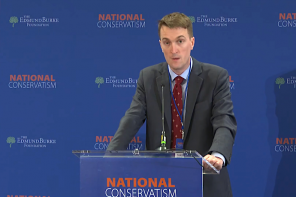Ben Adler has a piece over at TAP that asks whatever happened to those vaunted evangelicals who cared about the environment, rather than fixating exclusively on “social issues.” It asks some good questions, but it misses the mark on a lot of the religion angle of the story.
Adler’s starting point, a good one, is why the heck the Republican presidential candidates are running like frightened little bunnies away from supporting cap and trade. He points in particularly to Tim Pawlenty, whose pastor is Leith Anderson, president of the National Association of Evangelicals, which has (in a rather lackluster way, in my view) promoted “creation care.” As governor of Minnesota, Palwenty supported cap and trade. Now, he’s flip-flopped like the rest of them, running scared from both the Koch and the Jesus wings of his party, neither of whom want the government meddling in the God-given free enterprise system.
Adler maintains (again, correctly, in my view) that evangelical environmentalism was overhyped in the press over the past few years. But he misses how the NAE lost its chief environmental advocate when it purged Rich Cizik in 2008 after he publicly stated his support for civil unions. Since leaving the NAE, Cizik lobbied for cap and trade, working with groups like Friends of the Earth to raise alarm bells about the environmental destruction wrought by global warming. (There had been an earlier effort to expel Cizik — over his support for combatting global warming.)
Still, though, advocates like Cizik and Restoring Eden founder Peter Illyn, who also pushed for cap and trade, face opposition from fellow evangelicals: some don’t like calling themselves “environmentalists,” a term they associate with lefty secularism; others grumble that “creation care” has focused more on the “creation” rather than the “Creator.” Still others maintain suspicion about government regulation, a question pollsters should really drill down on when surveying attitudes on the environment and environmental regulation. Many evangelicals support “limited government,” not based on secular libertarianism, but because they believe that God ordained only a limited role for the government — the rest left to churches, families, and individuals. (That view explains the happy coalescing with the Tea Party, incidentially, which is more evangelical than the population as a whole, and why Republican candidates call for eliminating the EPA.)
As I pointed out again earlier this week, jumping off of Peter Laarman’s essay about why religious arguments fail, evangelical support for immigration reform moved not a single Republican in favor of it. Republican candidates know how to weigh the evangelicals against other wings of the party, and they know opposing immigration reform won’t kill evangelical support for the party. The same is true of cap and trade (in fact, there’s been less public evangelical support for cap and trade than there has been for immigration reform).
In trying to assess why evangelical support for environmentalism has lagged, Adler includes a very odd paragraph:
Pew never found that the extremist-right-wing Dispensationalist Christian view of the environment “was ever embraced by evangelicals on a mass scale.” Dispensationalism holds that we had better make the most of our natural resources before the imminent End Times, and it has been invoked by the media since Ronald Reagan appointed James Watt, a Dispensationalist Christian, as Secretary of the Interior.
“Dispensationalist Christian” can refer to a lot of things, but I think what Adler means is Christians who believe in end-times eschatology, which is includes a variety of views on how and when the end-times are going to come about. Dispensationalism, in particular, is a belief system that holds that we have and will live in different “dispensations” or periods, leading up to the end-times. Within dispensationalism, there is a great variety of views on whether, among many other things, Jesus will return and create a kingdom on earth, or whether believers must create such a kingdom in order for Jesus to return. Given the enormous theological variety, there is certainly no single view on environmentalism, and it’s just not accurate to say that “dispensationalism holds that we had better make the most of our natural resources before the imminent End Times.”
Indeed the most important, and prevalent views among evangelicals that explain the overall lack of ardor for environmentalism is dominionism, and their views on the “limited” role of government. Dominionism holds that God gave humans dominion over the earth; combine that with a common evangelical view of Romans 13, that God ordained government with a narrow role (meaning minimal regulation) and you can see how evangelical leadership promotes the view among their followers that the government is just getting in the way of their God-given “freedom” to be a dominionist. What’s more, as Lauri Lebo has reported, the anti-science roots of the creationist movement, which denies the reality of evolution, are just as potent in climate change denial. Creationists and promoters of intelligent design are beginning to use the same tactics they’ve used in their crusade against teaching environmentalism in schools to teaching climate change, including calls to “teach the controversy” — even though, just as with evolution, there is absolutely no scientific controversy, but rather agreement.
Now that would be a story: evangelical environmentalists going toe-to-toe with the climate change deniers who are out to teach kids that climate change, like evolution or the separation of church and state, is just a myth.




